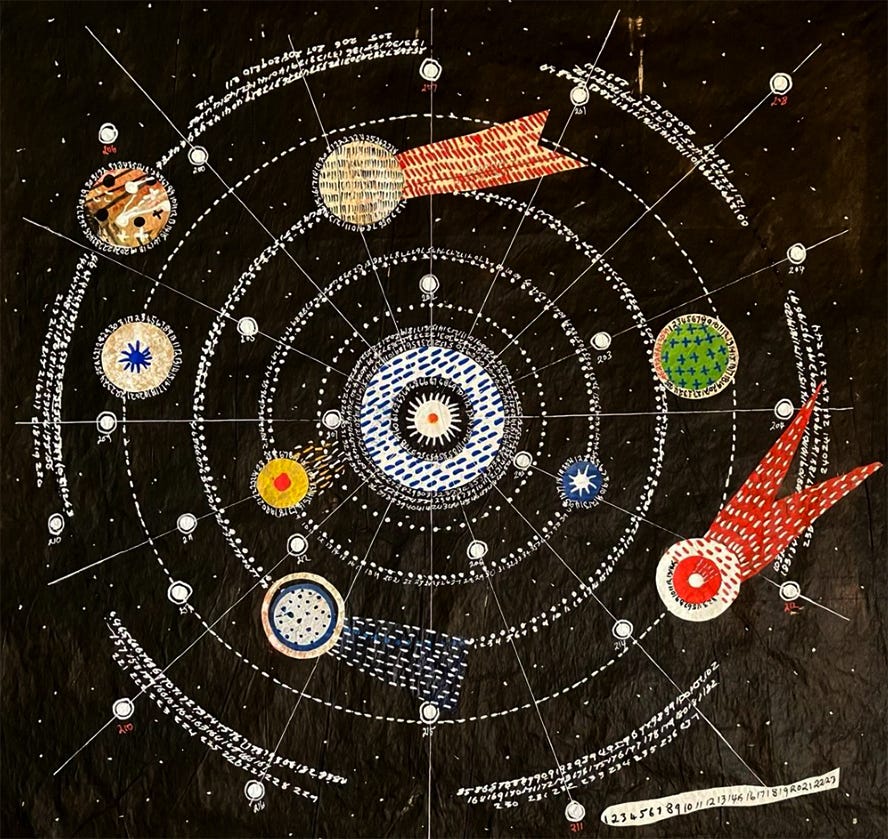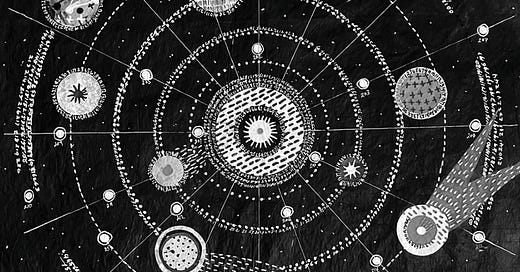How To Become an Astrologer: Part 1
Some random pointers that deliver big time. More to follow as they occur to me.

WHO DOESN’T WANT to become an astrologer nowadays?
Yesterday the gal that was ringing up my groceries at the market told me she was taking an online course in astrology.
And then, we swapped some planetary markers between our charts. The young guy bagging the food nodded his head as if he, too, had a Venus in Gemini and knew what we were laughing about.
So, here are some key pointers if you’re ready to hunker into your astro-odyssey.
1. The central point concerns ‘why’ not ‘how.’ If you understand the ‘why,’ it will be easier to land on the ‘how.’
2. There’s a mysterious serendipity at work with becoming an astrologer, and it relates to that old saying, “When the student is ready, the teacher appears.”
And I’d also add, “When the student is ready, the teacher disappears.”
However, your first link with astrology might show up in an unlikely, synchronic way. Perhaps your mom’s friend is an astrologer, or you discover a book on astrology that someone left on a seat on a bus.
Let’s look at the ‘why.’
3. So the ‘why’ relates to your relationship to nature.
In the beginning, was nature. Nature has a concealed agenda we can only dimly know, and astrology is an imaginative construction that helps us to align with nature. And perhaps, maybe, possibly, receive clues as to nature’s agenda.
If you have a poor relationship with nature, you will be a bad astrologer. When I say relationship, I mean you’d need to have a sense of awe about nature and nature’s mysteries. Both its beauty and terror. Without those two qualities or ‘responses,’ astrology will reject you.
4. When you contemplate your relationship to nature, you will begin to contemplate how astrology first appeared in humankind’s imagination. As soon as people were walking upright and able to turn their heads up towards the sky, astrology was born.
5. Astrology is more than doing horoscopes, which comes later in astrology’s history (and your own, as a student).
Astrology overlays nature with the awareness of cycles, and this notion developed over thousands of years of empirical observation by humans. Astrologers look at how those cycles relate to life on earth. This study of cycles is at heart, the foundation of astrology as an art.
6. That leads to the question of what art is. And that’s a larger discussion for another time. But put simply, art is a means of contemplating and then expressing, in some form, humankind’s relationship to nature and how we respond to nature.
I like how astrologer Liz Greene puts it:
“Astrology is an art, rather than a science or a system of religious beliefs. But what, then, is art? The artist mediates between different dimensions of life. The images, sounds, words and forms which the artist utilises are languages which can communicate the meaningful patterns of levels of reality which would otherwise be incomprehensible or incommunicable to the rational mind. When we are affected by art, it is because the work speaks to us on many levels: intellectual, intuitive, emotional, visceral.”
Art is a way of becoming intimate with nature or attempting to understand or metaphorically express oneself as an artist relating to nature.
7. So there’s a world of endless contemplation involved with astrology, and that goes on and on through the astrologer’s career and studies. In some ways, an astrologer is always a student. He or she may teach astrology, but they are always a student.
8. The specifics of ‘how’ to become an astrologer should come with the caveat of how ‘not’ to become an astrologer. So taking the via negativa path is what I’ll discuss now.
9. Don’t avoid doing in-depth research. Check things out within the astrological community. Invest serious time in your investigation. Times are very different because of the internet.
I won’t start a rant about the internet, though I’ll quickly add that online life has given wide passage to amateurs and flakes.
There’s also a lot of bullshit online—which astrology has always suffered with con artists and grifters—but it’s exponentially larger now, and that’s a problem.
So don’t avoid doing research and getting vibes on this or that. Don’t feel you must commit to something (or someone as a teacher) quickly.
10. Don’t skip the books. So much of your development as an astrologer involves reading. A lot of reading. Most astrologers are autodidact.
I’d say 80% of my knowledge as an astrologer came from books and doing charts for clients.
And don’t read bad books—the sort of pop astrology stuff (how to have good sex via the Zodiac, how to find a boyfriend with astrology, and how to know your soul’s purpose).
In a future post I will list my top 10 books for a novice astrologer. Stay tuned.
11. Don’t take a fly-by-night course online.
If I were starting again as a curious young person passionate about astrology, I would move to England.
In the UK, astrology is taken seriously, teachers are vetted, and students are required to bust ass for their degrees or certificate. This usually happens within a traditional academic setting, separating the wheat from the chaff.
12. But we can’t all move to England. So where does that leave things, practically speaking?
To simplify, I’d say start with good, well-written books on astrology. Steep yourself in solid books and then let your feelers lose to begin asking questions from peers or friends that are also interested.
Check out the forums on places like Skyscript; that’s a good place to start for beginners.
13. After contemplating, and researching what and who is out there, comes the next decision, and it’s a big one.
Do you want to practice psychological-based astrology or event-oriented traditional astrology?
First, let me say you can’t avoid learning traditional astrology, with its template of rules and laws, rulerships, dignities, and all that content.
When I teach astrology, I begin by having those basics covered. But then I move on. I find the traditional approach limiting and stuck in an eddy that hampers the imagination.
14. If you’re of a more worldly or scientific bent, the literal rules and laws of traditional astrology will most likely appeal to you.
It gives a safe framework to work within but also has sketchy circumstances that can arise when delineating horoscopes.
I mean, sketchy for your relationship with yourself and especially so when reading charts for clients. This is a topic for another time, but I want to mention that. I allude to some of the problems in this recent post.
15. Psychological astrology allows for what I call inquiry with oneself and with ‘reading’ charts for others.
Inquiry is an interesting mix of knowledge that one brings forward to meet the unknown conditions of the moment. And then to see what that meeting develops.
Psychological astrology uses the horoscope as the touchstone for that sort of open-ended inquiry.
16. The thing about psychological astrology is it involves double the work, and this is why there are extensive courses on the subject in England.
You must learn the astrological basics and touchstones, but you also must develop an understanding of psychology and a psychological lexicon that enables you to communicate with your clients once you begin offering your services as an astrologer.
As psychology became more prevalent in the culture, it created a language for people to discuss things more humanely.
Before the appearance of psychology, people had a limited vocabulary to consider the human condition, and when language is limited, so too is one’s life.
OK, so that’s a starter set of pointers. I’ll return to this theme in another post or two.
But please use the comment section to ask me questions or share experiences. I’ll be monitoring the feed closely.
Love,







I read this post, as I do all your posts, with great interest Frederick. Having seriously begun to study astrology after you and I began working together in 2012, I agree one is always a student of astrology. My own studies have led me to believe that one’s soul purpose is indicated/symbolized with the Moon’s nodal axis. So, I disagree that astrology can’t help us discover this. However, I agree one won’t learn much of use from bad” books. IMHO, the best book out there on this topic is Jan Spiller’s “ Astrology for the Soul”. But, maybe I’m wrong and I haven’t contemplated astrology long enough lol. You asked what art is. My question is then, what is nature? I think the two, art and nature, are equally important. Very curious to read your thoughts on all this.Thank you!
Yes well put. Amateur psychologists abound while new teaching takes away everything learned since Freud and turns the field into a farce.